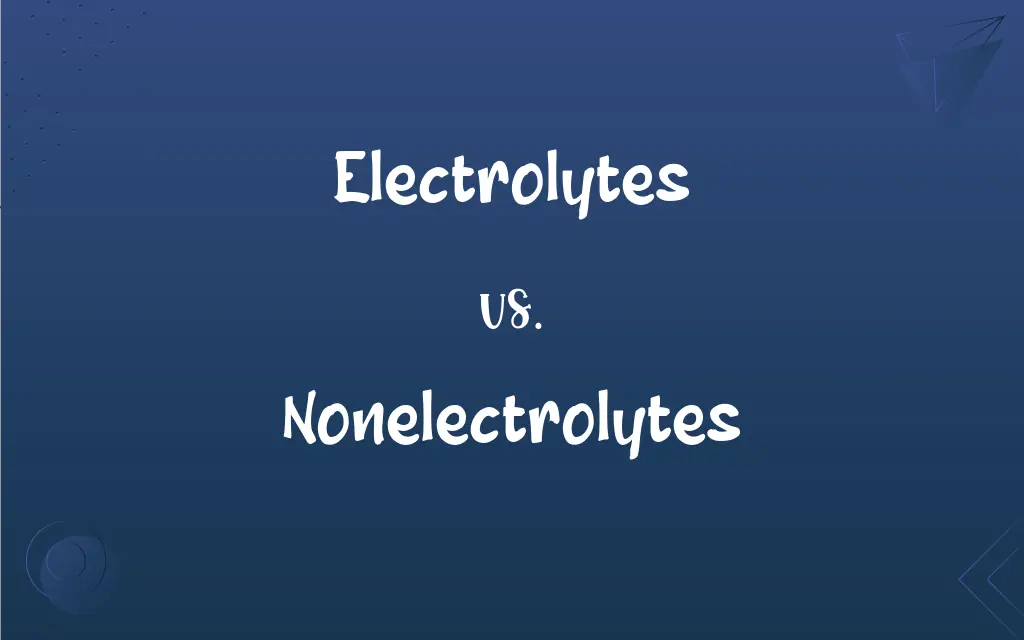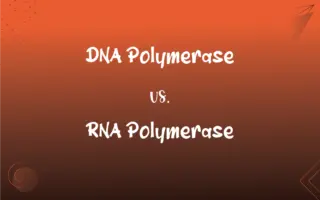Electrolytes vs. Nonelectrolytes: What's the Difference?
Edited by Janet White || By Harlon Moss || Updated on October 29, 2023
Electrolytes are substances that dissolve in water to produce conducting solutions due to ionization; nonelectrolytes don't produce ions when dissolved.

Key Differences
Electrolytes and nonelectrolytes represent two categories of solutes regarding their ability to conduct electricity in a solution. Electrolytes are substances that, when dissolved in water, break apart into ions, allowing the solution to conduct electricity. In contrast, nonelectrolytes dissolve without forming ions, resulting in a non-conductive solution.
The key to the behavior of electrolytes lies in their molecular structure and their ability to ionize in water. When electrolytes dissolve, they release positive and negative ions, which are responsible for conducting electric current. Nonelectrolytes, on the other hand, maintain their molecular structure and don't produce charged particles in solution.
Common examples of electrolytes include salts, acids, and bases, which all have the capacity to produce ions when in aqueous solutions. In daily life, these ions play vital roles in maintaining physiological functions. Nonelectrolytes like sugar or ethanol, despite dissolving well in water, don't produce ions, making their solutions non-conductive.
It's important to note that the strength of electrolytes can vary. Strong electrolytes, like sodium chloride, completely dissociate into ions in water, while weak electrolytes only partially ionize. Nonelectrolytes, regardless of the amount or concentration, never ionize in solution.
Both electrolytes and nonelectrolytes are crucial in various applications. While electrolytes are fundamental in batteries, physiological processes, and balancing body fluids, nonelectrolytes have importance in various chemical reactions and processes where ion production is undesirable.
ADVERTISEMENT
Comparison Chart
Ion Production
Produce ions when dissolved
Do not produce ions
Electrical Conductivity
Conduct electricity in solution
Do not conduct electricity
Examples
Salts, acids, bases
Sugar, ethanol
Behavior in Water
Ionize in water
Dissolve without ionization
Role in Physiological Process
Crucial for maintaining body functions and fluids
Generally don't play a direct role in ion balance
ADVERTISEMENT
Electrolytes and Nonelectrolytes Definitions
Electrolytes
Electrolytes can be either strong or weak based on their ionization degree.
While hydrochloric acid is a strong electrolyte, acetic acid is a weak one.
Nonelectrolytes
Nonelectrolytes remain molecular in solution.
Glycerol, when dissolved, remains in its molecular form without releasing ions.
Electrolytes
Electrolytes are substances that can produce ions in solution.
Sodium and chloride are important electrolytes for maintaining fluid balance in the body.
Nonelectrolytes
Nonelectrolytes create non-conductive solutions.
A solution of ethanol in water doesn't conduct electricity as it's a nonelectrolyte.
Electrolytes
Electrolytes play a vital role in physiological processes.
The heart's rhythm depends on the proper balance of electrolytes.
Nonelectrolytes
Nonelectrolytes don't impact the electrical properties of a solution.
Adding glucose to water doesn't change its conductive properties.
Electrolytes
Electrolytes allow solutions to conduct electricity due to ionization.
Battery solutions often contain electrolytes to facilitate the flow of current.
Nonelectrolytes
Nonelectrolytes are substances that dissolve without producing ions.
When sugar dissolves in water, it remains molecular and doesn't produce ions.
Electrolytes
Electrolytes can be acids, bases, or salts.
Potassium hydroxide, a base, is considered an electrolyte.
Nonelectrolytes
Nonelectrolytes are typically organic compounds.
Urea, an organic compound, acts as a nonelectrolyte in water.
Electrolytes
A chemical compound that ionizes when dissolved or incorporated in another substance, thereby producing an electrically conductive medium.
Nonelectrolytes
Plural of nonelectrolyte
Electrolytes
A solution in which such compounds are ionized.
Electrolytes
(Physiology) Any of various ions, such as sodium, potassium, or chloride, required by cells to regulate the electric charge and flow of water molecules across the cell membrane.
Electrolytes
Plural of electrolyte
FAQs
How do nonelectrolytes differ from electrolytes in behavior?
Nonelectrolytes dissolve in water without producing ions, resulting in a non-conductive solution.
Can nonelectrolytes ever become electrolytes?
Typically no, nonelectrolytes inherently don't ionize; however, some can react to form electrolytic products.
What are electrolytes?
Electrolytes are substances that produce ions in solution, enabling electrical conductivity.
Why are sports drinks rich in electrolytes?
Electrolytes in sports drinks help replenish ions lost through sweat and maintain hydration.
Are all salts considered electrolytes?
Most salts are electrolytes as they dissociate into ions when dissolved in water.
What happens to the ions of electrolytes in solution?
The ions of electrolytes freely move in solution, facilitating electrical conductivity.
Are there any health risks associated with electrolyte imbalances?
Yes, imbalances in electrolytes can lead to health issues, including dehydration, heart rhythm disorders, and muscle dysfunction.
Do all nonelectrolytes dissolve well in water?
Not necessarily. While many nonelectrolytes dissolve, some may not be very soluble in water.
Do all solutions of nonelectrolytes lack electrical conductivity?
Yes, nonelectrolytes do not produce ions, so their solutions are non-conductive.
What happens when nonelectrolytes dissolve in water?
Nonelectrolytes dissolve without ionizing, so they remain molecular in the solution.
Is sugar an electrolyte?
No, sugar is a nonelectrolyte; it dissolves in water without producing ions.
Why are electrolytes used in batteries?
Electrolytes facilitate ion movement, essential for the flow of electric current in batteries.
Why are electrolytes important in the human body?
Electrolytes help maintain fluid balance, nerve function, and muscle contractions.
Can pure water act as an electrolyte?
Pure water is a very weak electrolyte because it slightly ionizes, but it's practically considered a non-conductor.
Are all nonelectrolytes organic compounds?
Many nonelectrolytes are organic compounds, but not exclusively so.
How can one determine if a substance is an electrolyte?
Dissolve the substance in water and test its conductivity. If it conducts electricity, it's an electrolyte.
Why don't nonelectrolytes ionize in water?
The molecular structure of nonelectrolytes prevents them from ionizing when they dissolve.
Are all acids and bases electrolytes?
Most acids and bases are electrolytes, but their strength can vary based on ionization.
Do nonelectrolytes have any charge?
Nonelectrolytes don't produce charged ions in solution, so they remain uncharged.
Can a strong electrolyte become a nonelectrolyte?
Inherent properties define strong electrolytes; they can't become nonelectrolytes without changing their identity.
About Author
Written by
Harlon MossHarlon is a seasoned quality moderator and accomplished content writer for Difference Wiki. An alumnus of the prestigious University of California, he earned his degree in Computer Science. Leveraging his academic background, Harlon brings a meticulous and informed perspective to his work, ensuring content accuracy and excellence.
Edited by
Janet WhiteJanet White has been an esteemed writer and blogger for Difference Wiki. Holding a Master's degree in Science and Medical Journalism from the prestigious Boston University, she has consistently demonstrated her expertise and passion for her field. When she's not immersed in her work, Janet relishes her time exercising, delving into a good book, and cherishing moments with friends and family.































































